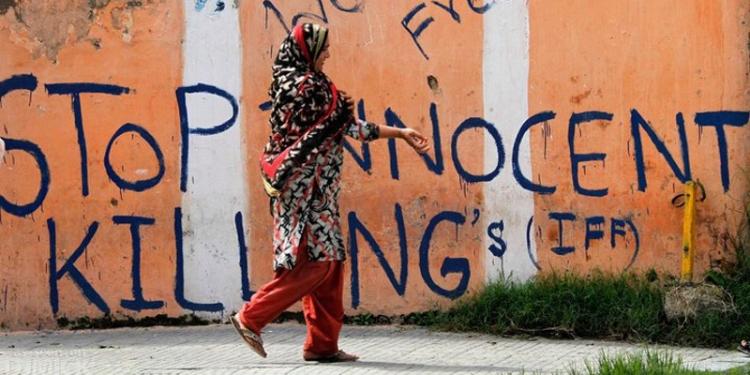
The Indian army initiated an investigation Dec. 26 into the deaths of three civilians in the Poonch district of Jammu & Kashmir territory. The individuals—Mohammad Ishaq, Zahid Iqbal and Shakir Ahmed—were reportedly in army custody following a militant attack on Dec. 21 that claimed the lives of four soldiers. The incident has stirred outrage and protests in the the already volatile region.
In the aftermath of the Dec. 21 attack, the army detained civilians from Topa Pir village in Poonch for questioning. Residents allege that the civilians were arbitrarily picked up and denied communication with their families. The bodies of three of those detained were discovered under mysterious circumstances near the Pakistan border on Dec. 22.
The National Commission for Minorities (NCM) condemned the incident, urging the Indian government to prioritize civilian protection and hold security forces accountable. The NCM also demanded a report on the killings. Chief Minister of Jammu & Kashmir Mehbooba Mufti also criticized the government over the incident.
While the Indian government expressed regret for the loss of life and promised a thorough investigation, initial statements defended the army’s actions and attributed the deaths to natural causes. Protests have erupted in Poonch and other parts of Jammu & Kashmir, with demonstrators demanding justice for the deceased and condemning the alleged brutality of the army. (Jurist)
The killings come amid a widening crackdown in Jammu & Kashmir. The Indian Ministry of Home Affairs (MHA) issued a ban Dec. 27 on the Masarat Alam faction of the Jammu & Kashmir Muslim League (MLJK-MA) for a five-year period under the Unlawful Activities (Prevention) Act (UAPA), in an effort to curb “secessionist activities.” (Jurist)
The MHA on Dec. 31 banned the separatist party Tehreek-e-Hurriayt (TeH) as an “unlawful association” under the UAPA, similarly for five years. The ministry says the ban was imposed in response to TeH’s engagement in “fomenting terrorism” and disseminating “anti-India propaganda.”
TeH was founded by late separatist leaders Syed Shah Geelani and Mohammad Ashraf Sehrai in 2004 after Geelani’s former party, Jamaat-e-Islami Jammu & Kashmir, was banned in 2019 by the Indian government. (Jurist)
Photo: Kashmir Global via Nationalia





Detentions reported as Modi visits Kashmir
Indian Prime Minister Narendra Modi has made his first official visit to the state of Kashmir since his government stripped it of special autonomous status and divided it into two parts in 2019. Security had to be ramped up ahead of Modi’s arrival, with thousands of police and paramilitary forces stationed throughout Srinagar. There were also reports of detentions. (TNH)
India high court rules for free speech in Kashmir case
In a groundbreaking ruling delivered on March 7, the Supreme Court of India declared that the lawful exercise of dissent is protected under the Indian Constitution.
The verdict addressed a case involving Javed Ahmad Hajam, a resident of Baramulla in Kashmir, who faced charges under Section 153A of the Indian Penal Code (IPC). The charges stemmed from his critique of the abrogation of Article 370, which granted special autonomous status to Jammu & Kashmir, and his expression of goodwill towards Pakistan on its Independence Day.
The court stated that labeling the revocation of Jammu & Kashmir’s special status as a “black day” does not constitute incitement of hostility between groups or communities along religious lines under Section 153A of the IPC. The court also emphasized that extending goodwill to citizens of other nations on their independence days is a permissible gesture safeguarded by constitutional rights. (Jurist)
India police make arrest in Kashmir terror attack
The police of the Indian region of Jammu & Kashmir have arrested an individual, identified only as Hakimdeen, who suspected of being involved in a recent terror attack in the territory, the first arrest in the case. The investigation is being handled by India’s National Investigation Agency (NIA)
On June 9, a bus carrying Hindu pilgrims in the Reasi area was attacked, resulting in nine killed and 33 injured. The pilgrims were headed to Shiv Khori, is a famous cave shrine devoted to the god Shiva.
Security officials have alleged that Pakistan-based Islamist group Lashkar-e-Taiba was behind in the attack. The incident notably took place during the swearing-in ceremony of Indian Prime Minister Narendra Modi in Delhi.
Dozens dead after mass shooting in Kashmir
A group of gunmen opened fire at a tourist resort in Indian-controlled Kashmir April 22. At least 20 tourists were killed, with dozens more injured. No one has claimed responsibility for the attack yet but local authorities are blaming militants fighting against Indian rule of the region. (PRI)